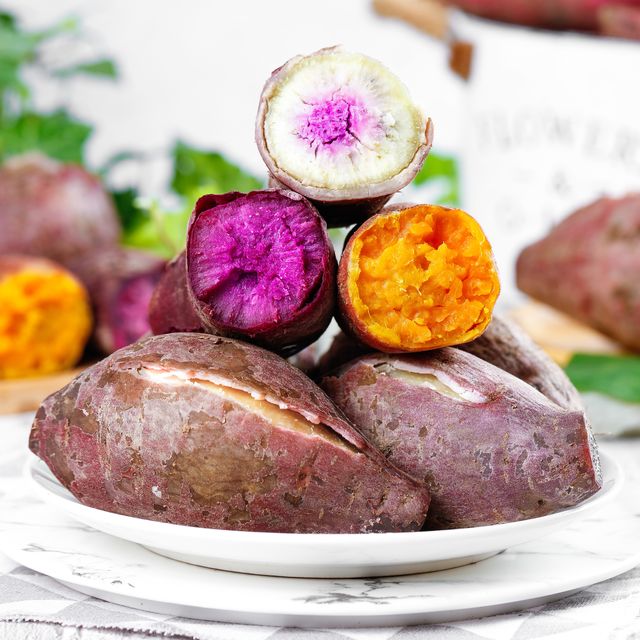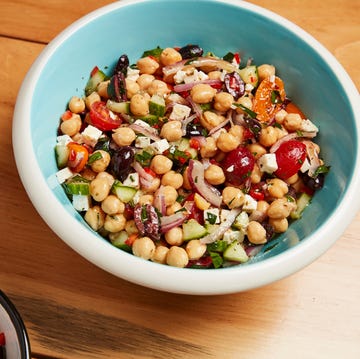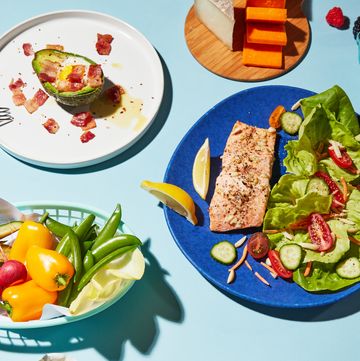You might relate sweet potatoes to the fall or holiday season. But there’s good reason to add them to your plate all year. In fact, considering the plethora of health benefits you get from sweet potatoes, they’re certainly worthy of adding to your list of foods to fuel your runs.
Read on to find out exactly what kind of nutrition is packed in a sweet potato and how adding them to your diet can improve your health.
What are the nutrition facts for sweet potatoes?
Just like regular potatoes, sweet potatoes come in a variety of colors and tastes, from orange to purple to cream and ranging in level of sweetness. This means, also just like regular potatoes, the nutritional value of any given sweet potato will vary slightly depending on the type. But ultimately, no matter which kind you buy, sweet potatoes pack the nutrients runners need.
For example, a study published in the journal Food Measure in 2017 examined 14 varieties of Virginia-grown sweet potatoes. Researchers determined the sweet potatoes with lighter colored flesh had the highest starch content, while those with purple flesh had the highest amount of flavonoid and phenolic compounds, which are known for helping to reduce inflammation. Orange flesh sweet potatoes contain the most sugar, according to the research.
All these different types of sweet potatoes are similarly rich in vitamins and minerals such as vitamin A, vitamin B6, vitamin C, potassium, and also fiber, says Robin Foroutan, R.D.N., integrative and functional dietitian in private practice in Garden City, New York. “For example, orange sweet potatoes are richest in beta carotene. But the purple ones are the highest in an antioxidant called anthocyanins. The pigment is a reflection on the amount of the antioxidants. But they’re all healthy for us,” she explains.
Just how healthy? According to the USDA, a medium sweet potato contains:
- 115 calories
- 2 g protein
- <1 g fat
- 27 g carbs
- 4 g fiber
- 9 g sugar
- 347 mg potassium
- 41 g sodium
- 41 g calcium
- 27 mg of magnesium
- 19 mg of vitamin C
That’s a whole lot of nutrition for one sweet potato.
What are the health benefits of sweet potatoes?
There are multiple ways you can benefit from adding sweet potatoes to your plate.
As we mentioned, sweet potatoes pack nearly 4 grams of fiber, which supports good gut health. You can encourage the formation of resistant starch (a gut-friendly fiber) in a sweet potato by cooking it and then letting it cool for an hour, says Foroutan. This starch is a very important prebiotic, which feed probiotics—both are super important for the gut, she explains.
Also, sweet potatoes contain a variety of antioxidants, which are known for helping the body fight free radicals and keep you healthy. For example, orange flesh sweet potatoes are rich in beta carotene, the antioxidant that causes its orange hue and helps runners fight inflammation, says Kelly Pritchett, Ph.D., R.D., C.S.S.D., professor of nutrition and exercise science at Central Washington University. This makes sweet potatoes a great recovery food because cooking them enhances the availability of beta carotene which can help runners combat the oxidative stress they build up on the run, Pritchett says.
A review published in the journal Nutrition Research supports the idea that beta carotene can reduce oxidative stress. Meanwhile, a review published in the Archives of Biochemistry and Biophysics in 2018 also highlighted beta carotene as an antioxidant that can help improve cognitive function, skin health, and immunity.
Sweet potatoes also contain 27 grams of carbohydrates, and those carbs are considered complex, says Pritchett, so they can provide runners with steady energy. This is because, Foroutan explains, complex carbs can be broken down in the body more slowly than refined carbs. Meaning complex carbs take longer time to digest and have slower impact on blood sugar.
However, the most powerful way to maintain steady blood sugar is to combine any carbohydrates with protein and fiber, so Foroutan suggests avoid eating this veggie alone unless you’re having it soon before a run and want those carbs more quickly available for fuel.
How can you incorporate more sweet potatoes into your diet?
The best way to eat a sweet potato, Foroutan says, is baked with either chicken, turkey, lean grass-fed beef, lentils, eggs, and/or other veggies. To mix things up and get creative, consider cubing up a few different colored sweet potatoes and roasting them together for a side dish, or making a sweet potato hash and adding them to your breakfast plate with eggs and spinach, she says.
The combo of carbs and potassium make sweet potatoes a great prerun snack. To have one before you hit the road, bake them, then sprinkle with a bit of salt. Just be mindful of their fiber content. “Runners will want to experiment in training to see how their gut responds to eating them prerun,” says Pritchett.
If you’d rather save sweet potatoes for after your workout, Pritchett suggests mixing them into a recovery smoothie, or topping them with beans, cheese, and salsa for dinner.
One thing to avoid: frying sweet potatoes, as the mixture of high temperatures, oils, and starch creates the formation of a compound called acrylamide, which is known to be a potential carcinogen, Foroutan says. Also avoid adding too much marshmallow topping, which is the fastest way to turn this sweet veggie into a sugar bomb, she says.

Monique LeBrun joined the editorial staff in October 2021 as the associate health and fitness editor. She has a master’s degree in journalism and has previously worked for ABC news and Scholastic. She is an avid runner who loves spending time outside.













